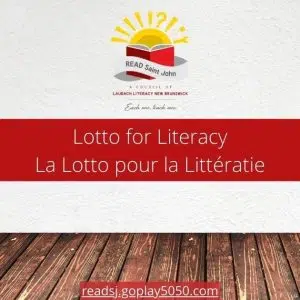Non-profit volunteer organization READ Saint John’s “Lotto for Literacy” campaign and updated website and social platforms are helping mark a brand new chapter in its commitment to adult literacy.
Vice President of READ Saint John, Josh Adams says the focus is on helping adult learners with literacy and basic math skills through one-on-one, confidential tutoring.
“The reality is for so many of our learners, they’ve got these practical goals that they want to reach,” says Adams. “Sometimes it’s about being able to encourage your child to become a bookworm and read to them and sometimes it’s the practical life goals, things like getting a driver’s permit or carrying through with being able to help children read.”
The “Lotto for Literacy” is a weekly 50/50 virtual fundraising draw, which is available to sign up for on READ Saint John’s website and Facebook page. The proceeds will go towards developing plans to continue their work during COVID-19 and getting the word out about the organization and the services they offer.
Read Saint John uses the Laubach Literacy Training System, which tailors each individual’s learning plan to their goals and interests rather than applying a cookie-cutter lesson plan to everyone.
“It’s going through some materials that are really going to interest the learner, because that engagement is so key in the learning process, particularly when the concern is such a deeply personal one,” he said.

READ Saint John Lotto For Literacy campaign (READ Saint John Facebook)
There are currently 28 learners which is consistent to an average learner group size for READ Saint John.
Adams adds one of the major advantages of one-on-one tutoring is that it takes it out of being a group context and puts it into learning with one person who you build a relationship with and trust, saying for many people, being low literacy can be a serious source of shame.
Laubach Literacy NB reports more than 50 per cent of New Brunswickers aged 16 and older, (or approximately 300,000 people in the province), are at either literacy Level 1, (having few basic skills great difficulty with text), or Level 2, (having limited skills and cannot read well).
Adams says many people across a variety of jobs and circumstances have been able to manage and get by with low literacy skills through creative solutions. “It would surprise you some of the sophisticated roles that people can carry out day-to-day, then you’d never know that this individual is low literacy,” he said.
According to Adams, READ Saint John struggled during the pandemic as its services rely heavily on being held in-person. “When COVID-19 struck, we needed to look at how do we move this online and how do we do this digitally and what are the barriers to that, for example if a person doesn’t have smartphone or laptop, they can use for the video conferencing,” said Adams.
They adapted quickly to a digital model, but it was difficult figuring out how to move forward during lockdown and the sliding back-and-forth between recovery phases.
“Like everyone else, we did struggle with being in phase orange and then phase red and there was we there was nothing that we could do for in-person tutoring at that time,” he said.
“We did encounter a significant concern with this requirement of wearing masks, given that if you’re wearing a mask you can’t see the person’s lips moving – when you’re teaching someone to read and how to form sounds so much of that instinctively is lip breathing,” said Adams. “We looked into the plexiglass face shields that are transparent and that was one solution we came up with to address that particular concern.
READ Saint John wants to raise awareness of literacy supports like themselves and the Saint John Learning Exchange, which its partners with to help people prepare for their GEDs through their campaign and new online platforms.
“It’s often the case that our tutors are every bit as excited as the learner to see these milestones being reached,” said Adams. “I’ve heard stories of tutors who did the happy dance in the DMV, after getting the results back that this learner passed and finally had the permit, and for such a long time being low literacy was standing in the way of being able to do that.”
For more information about READ Saint John and its services, you can check out their website.







